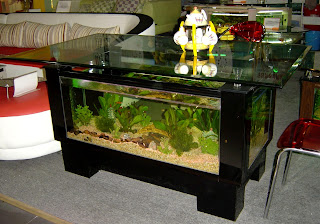An aquarium (plural aquariums or aquaria) is a vivarium consisting of at least one transparent side in which water-dwelling plants or animals are kept. Fishkeepers use aquaria to keep fish, invertebrates, amphibians, marine mammals, turtles, and aquatic plants. The term combines the Latin root aqua, meaning water, with the suffix -arium, meaning "a place for relating to".
An aquarist owns fish or maintains an aquarium, typically constructed of glass or high strength acrylic plastic. Cuboid aquaria are also known as fish tanks or simply tanks, while bowl-shaped aquaria are also known as fish bowls. Size can range from a small glass bowl to immense public aquaria. Specialized equipment maintains appropriate water quality and other characteristics suitable for the aquarium's residents.
If you want to enjoy observing fish and other marine life on a daily basis, you may wish to purchase a small home aquarium. Over 60 million people around the world own home aquaria, with almost 40 percent of hobbyists maintaining more than one aquarium. The smallest aquarium that is practical for home use is three gallons (11.36 liters), although you may choose to purchase a larger aquarium if you have the necessary space. Novelty aquaria designed to look like coffee tables, sinks, or other household items are another option to consider. If you wish, you can even make your own “MacQuarium” out of an old Apple Macintosh computer.
A home aquarium typically contains a water filtration system, a climate control device, and an artificial light. Most also have a hood available to reduce water evaporation and prevent debris from entering the tank. A home aquarium is typically made from glass panels joined with silicone, although acrylic and laminated glass aquaria are becoming increasingly popular since these materials are both durable and lightweight.
Home aquaria in a variety of styles can be purchased from any pet store. Prices will vary according to the size of the aquarium, the quality of materials used, and whether or not a stand is included. The store employees are typically trained to provide any assistance you need in selecting compatible fish for your aquarium.
Lighting that imitates natural lighting is excellent for aquariums, it helps both the fish and the plants, as fish, like most animals, require sunlight to remain healthy.
That said, incandescent lighting is worse for an aquarium than no lighting at all, it causes dangerous temperature fluctuations and does not provide the correct spectrum of light needed for fish and plants, the type of light you need is a full spectrum fluorescent.
The disadvantages of lighting is algae, so you should try to light only with artificial light (a fluorescent bulb), and not keep the aquarium near a window. The reason for this is that if you do get Algae, you can reduce the amount of light temporarily to help control it.





























